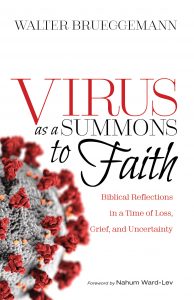 Books of Note for St. Thomas the Apostle’s Readers and Their Friends. This month’s feature book is Virus as a Summons to Faith: Biblical Reflections in a Time of Loss, Grief, and Uncertainty by Walter Brueggemann. Foreword by Nahum Ward-Lev. Cascade Books, 2020. ISBN-13: 978-1-7252-7673-4.
Books of Note for St. Thomas the Apostle’s Readers and Their Friends. This month’s feature book is Virus as a Summons to Faith: Biblical Reflections in a Time of Loss, Grief, and Uncertainty by Walter Brueggemann. Foreword by Nahum Ward-Lev. Cascade Books, 2020. ISBN-13: 978-1-7252-7673-4.
“Timely,” could not be a more appropriate descriptor for Walter Brueggemann’s new hot-off-the-press book. The daunting challenge of COVID-19 is on the minds of millions. The timeliness of Brueggemann’s important little book is not primarily about the coronavirus pandemic of the last several months. The real gift of this eminently readable book is the stunning way the message of scripture breaks in upon us with new meaning during these uncertain times. Brueggemann, Professor Emeritus of Old Testament at Columbia Theological Seminary, again demonstrates for us why his works are so widely read. He is no proof-texter or Bible-beater. Coronavirus is nothing less than an occasion to admit that that old religion of self-concern and false securities has failed.
Brueggemann tackles “the big three” disasters Israelite religion wrestles with: war or violence, plague or pestilence, and the result of pestilence, famine (see Lev. 26:25-26; Deut. 28:21-34; and Ezek. 6:11). Violation of the Torah brings disaster, the old transactional religion said; so, come correct in repentance and obedience, and YHWH will restore you to health and security. But Brueggemann argues that is not the way YHWH works. God is not “on call” to answer our desires. Neither is God a “fortune cookie” (p. 54). YHWH calls us into covenant, the deep, open-ended engagement between two free agents, which is the root of all true religious ethics, as Job testifies (Job 28 vv. 12, 20 and 28). Faith is no guarantee of anything, for God is utterly free. Instead, disasters like COVID-19 are a summons to a renewed covenant relationship with the Holy One.
We are bidden to leave behind the old, worn-out securities that were never secure anyway. Self-obsessions collapse under the weight of loss and grief. Our prayers get harder to pray, but lead us, writes Brueggemann, into a groaning akin to birth pangs.
His interpretation of Psalm 77 alone is worth the price of this book (pp. 46-56). Old religion is transformed into a new, resilient faith through the move away from the culture of “I” to encounter with the great, untamed “Thou” Who heard Hebrew slaves groan in the brick pits of captivity, and Who hears us, as well.
The virus can be a “gateway of groan” into a new normal of neighborliness where prisoners are treated differently, finances are generously shared, especially with those who need the resources to survive, and the burden of student debt is cancelled. Dreams? No, declares Brueggemann, not dreams—the birth of a new prophetic imagination and a renewed moral imagination for a new creation, one practically “grounded in the realities of dollars, laws, natural resources, and social conditions” (p. 58). The message of the virus is that there is no new creation without “the groan,” and no passage out of the groan without hope. Hope comes hard in times like ours. Nothing in the canon of both testaments promises a future without an exile and a cross. And yet…there is no Good Friday without an Easter to follow (Isaiah 43:18-19; Mark 8:35).
– Stephen V. Sprinkle, Theologian-in-Residence

